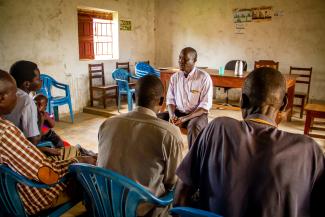USAID contributes to the Government of Uganda’s efforts to build and sustain a democratic, well-governed state that responds to the needs of its growing population. USAID actively engages and collaborates with the Government of Uganda on activities to promote good governance, political competition and consensus building, civil society advocacy, conflict mitigation and reconciliation, and human rights in alignment with Uganda’s National Development Plan. Our program also assists in making the voices of marginalized people heard—particularly women and youth—and in shaping the role of civil society in governance. This inclusive approach ensures that citizens enjoy a participatory style of governing and that leaders also benefit from the views of their constituents. Advancing democracy and promoting good governance contributes to enhanced stability in the country and the region.
GOOD GOVERNANCE
USAID works with officials and civil society organizations at all levels of local and national government. Our activities focus on building the government’s capacity to administer policies transparently and accountably, while promoting citizens’ participation in good governance. We work with local government officials and members of Parliament to strengthen responses to citizens’ demands, improve leadership skills and increase government accountability and transparency to improve service delivery. We also strengthen civil society organizations in advocacy, improve their organizational capacity, and promote an enabling environment for civil society to contribute to development outcomes.
ELECTIONS AND POLITICAL PARTICIPATION
Since Uganda established a multi-party system of governance in 2005, USAID has actively supported the development of democratic governance in which all voices are heard and respected. In partnership with civil society organizations, USAID works to promote effective citizen participation. Our activities help to develop innovative ways of using new technologies to support free and fair elections. Our activities also increase participation from underrepresented groups in the country—specifically women and youth. In the 2021 elections, USAID will continue to support civil society organizations to conduct civic and voter education and support citizens to exercise their right to vote. Through our activities, USAID helps to create space for all voices—including those of women, youth, and other minorities—to be heard.
HUMAN RIGHTS AND CONFLICT PREVENTION
USAID works to increase effective advocacy for human rights, especially the rights of activists, journalists, and vulnerable groups such as women, youth, LGBTI, and people with disabilities. Our activities provide legal assistance and protection, training, documentation and monitoring of abuses, and advocacy for a legitimate rule of law framework to safeguard human rights and improve access to justice for the most vulnerable. Additionally, USAID works to resolve conflict and prevent conflicts from escalating. Our conflict mitigation and reconciliation activities make significant contributions to the return of peace, recovery, and development to northern Uganda, Karamoja and Rwenzori. Our activities facilitate access to justice to resolve land disputes, promote reconciliation and transform emerging conflict into opportunities for people to develop collaborative solutions.
DOMESTIC RESOURCE MOBILIZATION
USAID works with the Government of Uganda, the private sector and civil society to strengthen domestic revenue mobilization (DRM). Our activities strengthen the tax culture, increase voluntary compliance, and sustainably increases domestic revenue, thereby creating the fiscal space for public spending and investments in service delivery and other priority areas. DRM not only provides governments with the funds needed to alleviate poverty and deliver public services, but is also a critical step on the path out of aid dependence.

Karin Bridger/USAID
